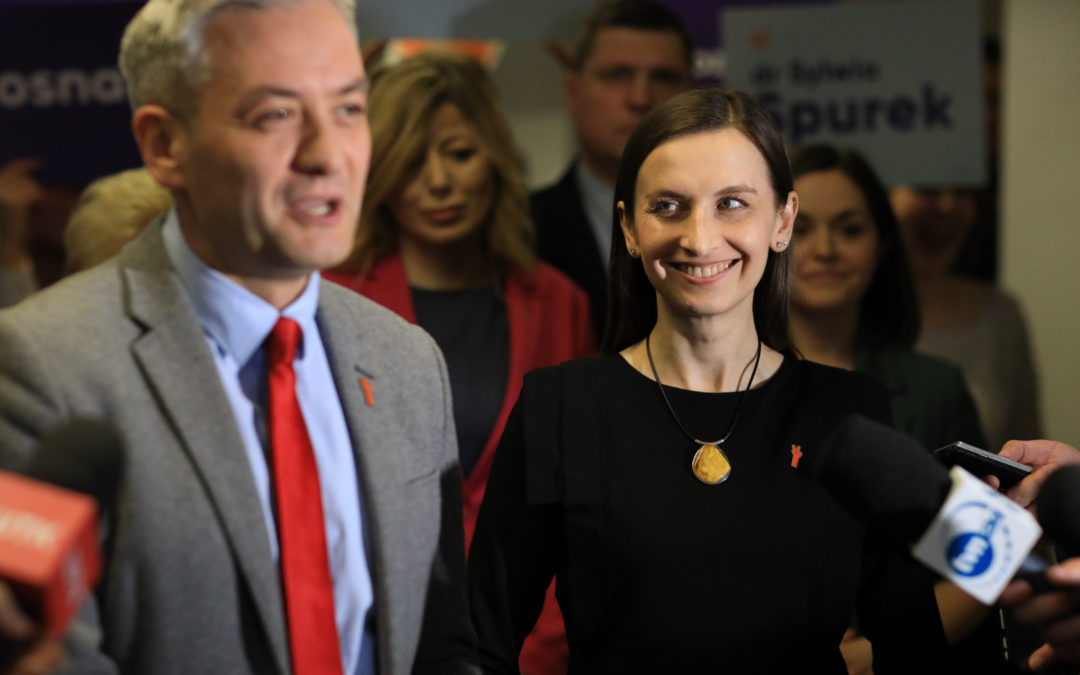Sylwia Spurek, a member of the European Parliament and advocate for veganism, has been widely condemned for a Twitter post that likened the treatment of animals to the Holocaust.
Jo Frederiks daje do myślenia, otwiera oczy na to, jak traktujemy zwierzęta. Ten obraz przypomniała @Fundacja_Viva i dobrze, bo czas na poważną dyskusję o traktowaniu zwierząt, o warunkach, w jakich żyją, o tym, jak je zabijamy. Czy to jest humanitarne? Czy to nadal rolnictwo? pic.twitter.com/qlFVADiiCh
— Sylwia Spurek (@SylwiaSpurek) January 21, 2020
Spurek, who was elected to represent the Spring (Wiosna) party but is now an independent member of the Progressive Alliance of Socialists and Democrats, shared the image “When will we ever learn?” by Australian animal rights advocate and artist Jo Frederiks.
The graphic depicts cattle being led to slaughter, wearing striped pyjamas reminiscent of those worn by concentration camp prisoners and yellow stars like those which Jews were forced to wear in the camps.
The MEP, who is a vegan and formerly Poland’s deputy commission for human rights, wrote: “Jo Frederiks makes one think and opens one’s eyes to how we treat animals…time for a serious discussion on the treatment of animals, the conditions they live in, how we kill them. Is this humane?”
Spurek’s call for a debate comes at a sensitive time, days before the 75th anniversary of the liberation of Auschwitz, an event that has already caused controversy. Polish president Andrzej Duda announced that he will not attend a commemoration in Israel as he would not be allowed to speak.
The anniversary will also be marked by an official ceremony at the former German Nazi Auschwitz-Birkenau camp, which is located in Poland, on Monday.
The Auschwitz Museum led the condemnation of Spurek’s tweet, writing that “instrumentalisation of the tragedy of the people who suffered and died in concentration camps is painful, especially for those who experienced this terrible history. The rights of animals deserve a better and wiser defence than banalisation of nightmarish human suffering.”
Jonny Daniels, the head of the From the Depths, a foundation that commemorates the Holocaust, described the post as “hateful, tasteless and offensive” and called on the president of the European Parliament to take action.
Dear @EP_President, this is a copy of the letter sent to your office this morning by us at @FTDepths following the hateful, tasteless and offensive post by MEP @SylwiaSpurek and urge you to take immediate action, just days before Holocaust Memorial Day. pic.twitter.com/u9wU1SQOKx
— Jonny Daniels (@MrJonnyDaniels) January 22, 2020
According to Radio Poznań, the Association of Polish Families of Concentration Camp Victims intends to sue Spurek. The association’s president, Elżbieta Rybarska, described her post as the “reprehensible” actions of the “pseudo-elite”.
Spurek has received little outright support for her post. Animal rights group Viva!, which first published the image and to which she addressed the original tweet, wrote: “The person who published [it] had somebody in the family who died at Auschwitz and thought that the comparison was no exaggeration…However, we took the view that it might be extreme for many people, and decided no longer to publish it anywhere.”
In her own defence, the MEP said that the work was based on the letters of Jewish prisoners, who themselves compared their suffering with the experiences of animals. She also quoted the Polish Jewish Nobel laureate Isaac Bashevis Singer, who said that “the satisfaction with which man can do whatever he like to other species illustrates the most extreme racist theories, according to which the strongest can do anything”.
“I am terrified of how people treat other animals,”said Spurek, “and I think that every intelligent person should understand the artist’s message.”
This is not the first time that Spurek has courted controversy since becoming being elected to the European Parliament last year. In August she tweeted that “we must make sure that production of animal products is more difficult and more expensive”.
She was also mocked, particularly by right-wing commentators, after telling Głos Wielkopolski, “I don’t eat anything that comes from animals…I believe that animals should not be used for research or entertainment, or consumption,” but then admitting to wearing leather shoes.
Vegetarianism and veganism have become more popular in Poland in recent years, but also more politicised. A recent report suggested that almost 40% of people were cutting back on meat and 8.4% had given it up completely, while Warsaw was recently ranked as the sixth most vegan-friendly city in the world.
Main image credit: Lukasz Cynalewski/Agencja Gazeta

Ben Koschalka is a translator, lecturer, and senior editor at Notes from Poland. Originally from Britain, he has lived in Kraków since 2005.




















